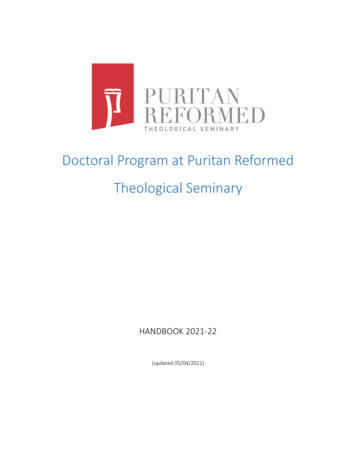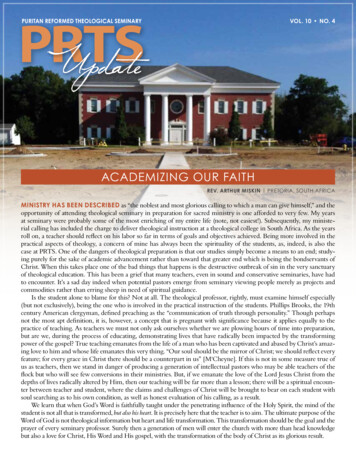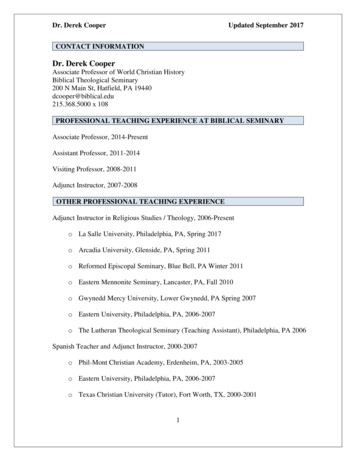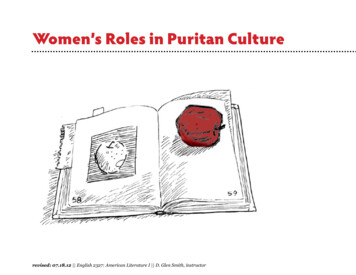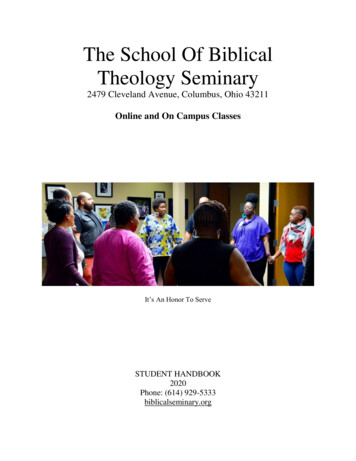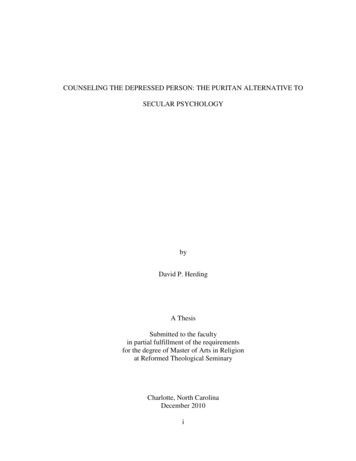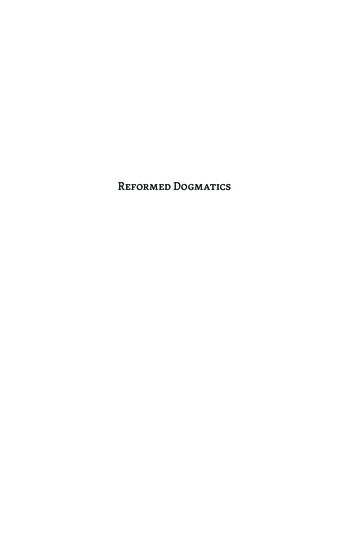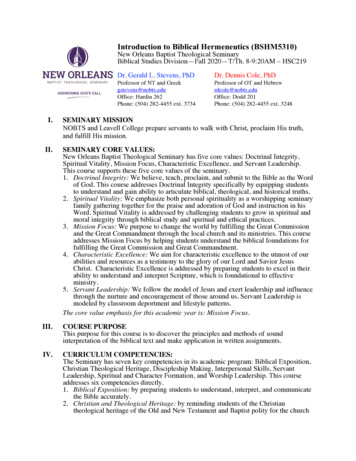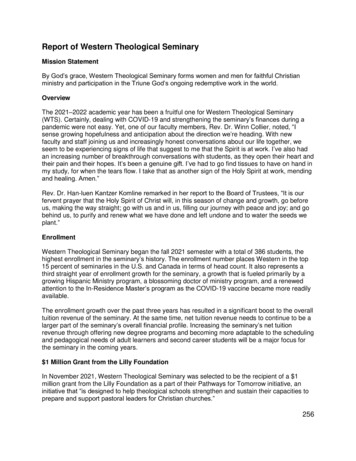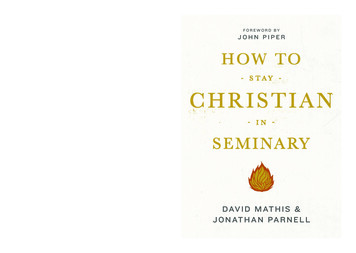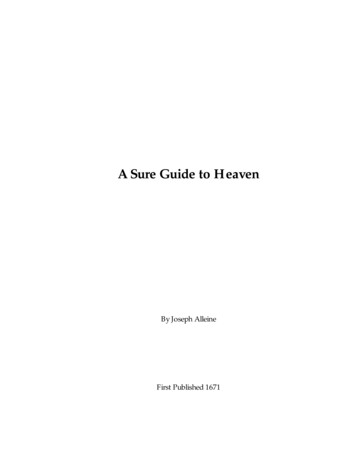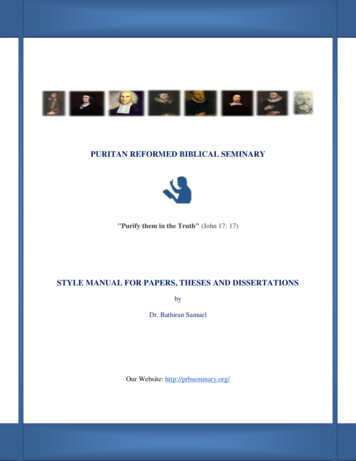
Transcription
1PURITAN REFORMED BIBLICAL SEMINARY"Purify them in the Truth" (John 17: 17)STYLE MANUAL FOR PAPERS, THESES AND DISSERTATIONSbyDr. Bathiran SamuelOur Website: http://prbseminary.org/
2PT306 THEOLOGICAL RESEARCH METHODS (3)Puritan Reformed Biblical SeminaryBachelor of Arts in Theological StudiesJanuary 2015COURSE OUTLINECourse DescriptionThis course is designed to teach the student with the rules/ methods and procedures for a theologicalresearch writing. He / she will be introduced here for the proper style and format of the theologicalresearch papers. Student is also provided an opportunity to write out a solid theological research paper onhis own.Course Objectives1. Students will know how to write and format papers in accepted manner.2. Students will be able to do research on their own improving their writing skills.3. Students will be able to collect all the available data concerning the research topic and reachproper conclusions.4. Students will be able to correlate theological truths by using proper research methods.5. Students will know how to seek any information on any topic.6. Students will know how to reach out the established facts/ new conclusions through suchgained information.7. Students will understand how to organize a seminary papers/ thesis/ dissertations.8. Students will know how to communicate the biblical/ theological ideas clearly andeffectively to the Christianity.Course TextbooksRequired TextbookTurabian, Kate L. A Manual for Writers of Term Papers, Theses, and Dissertations. Fifth edition.Chicago: The University of Chicago, 1987.Samuel, Bathiran. Style Manual for Papers, Theses and Dissertations. Class Notes: Puritan ReformedBiblical Seminary, Fall 2015.Course RequirementsPaper. The student is to write one theological research paper on the approved topic. The paper must betyped, one inch margins, double-spaced, and 20–25 pages in length, including bibliography. The papersshould follow the turabian guidelines and conform to the seminary manual for papers and theses.
3Course Grading The student should consult the catalog for the grading scale used in the seminary.The paper constitutes 100 % of the course grade. .Students may turn in class assignments through e-mail in a word/ pdf format as your mentordemands.Late assignments, unless the result of circumstances beyond the student’s control, are notaccepted.Except when permission has been granted by the mentor, the complete work not turned in by theend of the program time limits, is recorded as a zero and the student’s grade computedaccordingly.
4I. INTRODUCTIONIn PRBS, the students are to follow Kate L. Turabian’s A Manual for Writers of TermPapers, Theses, and Dissertations, 5-8th edition (Chicago: University of Chicago Press, 19872013) for writing papers, thesis and dissertations with the consultation of this document.Students should consult with Turabian guidelines for the issues not addressed in this paper.Contra to Turabian, when the students find formatting guidelines or style at this document, theyare advised to follow the instructions given in this manual. This means that the student must,first, carefully read this document and then check with Turabian guidelines. Students also areadvised to check with The SBL Handbook of the Style, 2nd edition (Atlanta, GA: SBL Press,2014) which is complemented by Turabian. When the students complete their papers, thesis,dissertation, their work must comply with style and format outlined in this paper. Along withthese, students also may check with these books for speed up their writing skills. [Porter G.Perrin, Writer’s Guide and Index to English. Fourth Edition (Oakland, N.J: Foresman andCompany, 1968); Kate L. Turabian’s A Manual for Writers of Term Papers, Theses, andDissertations, 5-8th edition (Chicago: University of Chicago Press, 1987-2013); Ron Fry, RonFry’s How to study Program: Write Papers (Hawthrone, NJ: The Career Press, 1991)]. Thewriter has gleaned from all these primary sources mentioned above in preparation of thisdocument for the purpose of paper writings at PRBS.What is Research?Oxford Concise Dictionary defines a research is “(a) the systematic investigation into andstudy of materials, sources, etc, in order to establish facts and reach new conclusions. (b) Anendeavour to discover new or collate old facts etc by the scientific study of a subject or by acourse of critical investigation.” Note that research is both the systematic investigation andcritical investigation which aims at establishing facts, reaching new conclusions, and discoveringnew facts or collating old facts. With this in mind, a student of research must begin his researchand writing for the benefit of the Christian world as he presents his thoughts in mostsophisticated ways in scholarly manner. Students should know that there are several unknown ornot well known facts are there. They should be explored or rediscovered. It may be one of thefollowing: i) A New Idea or ii) A Controversial Issue. It is the duty of the researcher to gather allthe available data regarding his research topic and explore it in a proper understandable andacceptable way.Purpose of Research PapersMost seminary papers require reading and written materials for courses. While this is truewith PRBS, it does not limit only to a studious inquiry of the subject but demands its studentswith more careful critical evaluation, assessment and interpretation of the documents read for theclass. Hence, the student is expected to submit a paper that is well written, well expressed, wellorganized and well documented. This facilitates students to get into actual investigation of the
5subject and its assessment and interpretation accurately. The student will basically learn how tocommunicate both others’ ideas and his own as well clearly in an acceptable format and style.Who is a Researcher?A researcher is the one who will have the following five views to establish facts/ reachnew conclusions when he does an actual research. These views help the student investigate histopic/ problem with different angle for the new findings. Briefly, this writer suggests below whatare his views: He must have a view of Detective who may investigative to find what the actual problemis, and present the truth with proper evidences. A detective looks with evidences forestablishing the truth. Therefore, student must review the evidence and reach out to theconclusions of what is truth and what is not. Do not blindly believe all the theologians orbooks you have been introduced, rather have their opinions, suggestions or conclusions tosee how that correlates to the entire body of truth found in the Bible.He must have a view of an Advocate. All legal authorities recognize the validity of whatis known as a prima facie case. This case exists when enough evidence is available toestablish a high probability of a fact being true that unless that particular fact somehowcan be refuted, still it is considered as proven fact. With this in his mind, he mustcarefully analyze the issues and reach the right conclusions with much confident after athorough investigation.He must have a view of devoted Christian Author. By this, he may share his informationto the Christian world so that people of God may be equipped for God’s work, and maybe transformed in their spiritual formation. As a researcher in Christian field, he will notlimit his knowledge to himself; rather he will greatly influence the world by the dynamicsof his writings.He must have a view of Journalist. In this view, he actually digs up all the factsconcerning the topic/ research subject, historical evidences, primary sources written onthe similar topic. He will have all the arguments set before himself, and carefully testthem with Scripture so that he may be not driven out by every wind of false doctrine orargument.He must have a view of Scientist. An applied scientist actually is conducting researchwith the aim of developing new technologies and practical methods. He does this withcreation which God has created. Likewise, theologians must have their research doneprimarily with the absolute truth (i.e., the Word of God). All the theologians know thatthere are several issues found in the Bible which have not been written clearly by thescholars until this day. By having this view, one who researches looks up new findings ashe attempts to solve the problematic issues found there in both OT and NT texts. This has
6to be done because Christian faith is being attacked by rationalism, liberalism, atheismand postmodernism etc.The Task of DifficultyWith the glimpse of this understanding about who is a researcher, now it is necessary toknow the task involved in it. Indeed, doing research is a tuff task but the work is rewarding.Researchers have to understand this and do their research on any topic in order to establish factsand reach new conclusions. While this sounds nice, this always makes a tiresome work for manystudents because of their ignorance of what is research and what involves in it.1 Often, thethought of spending hours and hours in the library, digging up information, writing a longdetailed paper and formatting foot notes etc., make the student not to have any interest in doingresearch, and they feel that this is tiresome work on their part. Even if the students have a greatdesire for working hard on doing their papers, still they acquire insufficient knowledgepertaining to it for finishing up the task in the best possible way with proper research methods.Therefore, this writer instructs all those interested in doing their research, to pay their attentioncarefully to the following ten steps, and implement them with proper goals and commitment sothat the best scholarly research paper can be presented.Research StepsStep # 1Step # 2Step # 3Step # 4Step # 5Step # 6Step # 7Step # 8Step # 9Step # 101A Research scholar must understand the time management.A Research scholar must recognize how to develop a research argument.A Research scholar must know where to find reference materials.A Research scholar must be committed for taking notes from those referencematerials.A Research scholar must acknowledge that now he is ready to write a paper.A Research scholar must make up a rough draft, and revise it again and again, makecorrections.A Research scholar must learn the strategies that improve his writing better, smotherand clearer.A Research scholar must arrange Bibliography of sources cited/ consulted properlyin the alphabetic order.A Research scholar must identify every typographical error and spelling mistakes.Now a Research scholar makes up a final draft for submission confidently knowingthat one of the finest papers is at hand.When students did not understand it properly, he or she fails to do proper research resulting in theproduction of worst papers.
7Step # 1: Understand the Time ManagementFirst, the student must create a work schedule otherwise he may not know how to managetime for completing the task with best quality. He must have always a careful timing andplanning. He must get out his calendar and mark the due date for the paper. Now, he should havea plan to spend half of that time on research, and the other half on writing. He must be afaithfully committed man for his daily work on each day/ week on the appointed timings. Toaccomplish the best paper, he himself, must have set deadlines for completing the followingthings in the writing process.S. No1)2)3)4)5)6)7)The TaskDeciding on paper/ angle of the paper.Making list of reference materials (bibliographic data)Reading the reference materials and take notesPreparing detailed outlineWriting the first draftEditing the paper and preparing bibliographyProof reading the paper; final draftDeadlinesStudents should plan on consulting and taking notes from at least ten to fifteen differentbooks, articles or other reference materials for a normal class room papers/ class assignments.However, this is not limited by the number. Student may use any sources as he desires but shouldnot be less. They also must plan on writing two or three drafts before arriving at final copy.Always, refer to the work schedule and adjust timings accordingly.Step # 2: Recognize How to Develop a Research ArgumentNo one needs to be a rocket scientist for producing a good research paper but a selfdisciplined man who delights in the Word of the God day and night. Who is this self disciplinedman? A self disciplined man is the one who, Plans ahead. He chooses the topic and gathers bibliographic data, take notes, outline thepaper, and have first draft, proof reading, and final draft.Be prepared and stay organized. He has all the research materials along with him. Hekeeps them in a separate notebook or file.Do not postpone. He will not put off doing his work in the last minute.Now, being a self disciplined man of God, every student must be a man who iscommitted to studying Scriptures diligently. This should lead him to develop his researchargument suitable to his audience who are longing for the proper biblical/ theological/ exegeticalconclusions. How can this be done? Or how the research argument could be developed from his
8topic? To find out answer to this question, first the topic of the paper must be decided, and thefollowing set of questions to be answered.(i) The Topic of the PaperThere are two things every writer must avoid for having the better topic in their research. First, aresearcher should not have a topic that is too big. Think for a moment that he needs to write a 40page paper for class, and he has decided his topic will be . Now thinkabout this: Can he really cover a topic that broad in 40 pages? He could write volumes on thesubject and may have plenty left to say. Instead, he must focus on a particular, limited aspect ofhis subject or discuss it from specific angle. Remember, students’ job is to produce an in-depthresearch analysis paper about the topic. Therefore, they need to do that in the number of pagesthe mentor requested. Second, a researcher should not have a topic that is too small. Havingunderstood the previous point, students must be aware of focusing too narrowly as well. Becausethis cannot make up a sound research analysis setting before the Christian world something thatis profitable. Therefore, they need to pick a topic that is too obscure, and a very little or noinformation has been written about it. In the same time, by choosing such a topic, students mustmake sure that there is enough research material available about the topic so that they may get awell rounded view of the subject. Pick the one that needs to be addressed for the Christian world.In addition to these,1) A Researcher must choose a topic that is meaningful to the Christian world. The chosentopic must edify others in Christian faith and practice.2) A Researcher must choose a convenient topic. This means that he should not choose atopic that could not be written or managed by him. Do not choose a topic on which littleor no information you already have.3) A Researcher should choose a topic on which he is sure that all the available informationis found. In number of ways, this will aid the researcher to continue his research workwithout any interruption or confusion.4) A Researcher should choose a topic approved by his Mentor. The chosen topic must beacceptable by his Mentor. Therefore, students must communicate to Mentor for approvalonce topic is selected.(ii) The following questions are to be answered. (Fill in the blanks with your topic)With the selected topic, the student also needs to pose some questions for the betterimprovement of his research. A Researcher will get to know the truth when he asks certain
9questions to the chosen topic. When he asks the key questions such as these, he actuallyidentifies the main concepts and keywords in these questions. These are potential terms forresearch and writing. By this, one can come to the point whether the topic has been completelycovered in another paper or published books. He also may be ensured to the point that there isenough information or data to cover the research topic. Observe the following key questions:1) What is the special attention about ?2) How is related to church history in the past?3) What impact has made on Christianity?4) What would I like the Christian world to know about ?5) What questions do I have about ?6) How has been misunderstood in the past centuries?7) What are best literatures available on ?8) What other writers failed/ lacked to discuss regarding ?9) Who will be benefited by this topic?10) What are the new conclusions or facts will be exposed by this topic?Having answered to these questions, the student is closer to his research argument. Heshould be ready to provide one-sentence summary of his paper/ thesis/ dissertation which sumsup the main point of the paper. Note that all the papers he produces must have this centralstatement summing up the entire paper as the main point.Step # 3: Know Where to Find Reference MaterialsBibliographic DataFinding reference materials for doing research is wise thing before actual writing takesplace. One should be wise enough to gather bibliographic data while collecting bibliography.This habit will eliminate all the interruptions for writing a paper. Bibliographic data includesauthor’s name, book name, editor/translator’s name, publishing place, publishing agency,publication date with page numbers for citation. Make sure to record total volumes in the multivolume set. So that students, without wasting their time, get into the proper books and pages,and this also will speed up the students’ research process.Reference MaterialsBefore trying to collect reference materials, it is good to make up a working bibliography.Use 3x5 cards for this purpose. Every student must know where to find reference materialsbefore the actual writing taking place. They also need to get to the library because they must do alittle advance research. They also must find out the books, encyclopedias, bibliographies and
10articles written about the research topic. By the time when they leave the library they shouldhave a general understanding of their subject.Students on this phase need to evaluate the reference materials as well. These materialsare basically divided into two groups: 1) General Reference Materials and 2) Specific ReferenceMaterials. The former includes encyclopedias and dictionaries, and the later includes books andperiodicals. To begin the research work, it would be best to go on the general reference materialsso that all the basic information needed for the topic is attained, and then, with such gainedknowledge, the Researcher may swim into the specific reference materials for more advancedresearch. With the general reference materials, one is aimed to see how the writer develops hisoutline and subject under proper treatment. Along with this, he also must find out historicaldevelopment of the topic. Always, check out the bibliography of the sources used by thatparticular author, and refer those materials for better understanding of the subject. With thespecific reference materials, one is aimed to analyze what present authors deal with the issuesfound in the past or in their times. How do they address on the writers of the past? Have theyreached proper conclusions by solving issues found up to date? Like these, a good number ofquestions to be answered for the best evaluation of the reference materials.When they are clear on their reference materials, they, now, are ready to take notes.Step # 4: Be Committed For Taking Notes from Those Reference MaterialsA Student must have a habit of visiting the library often for getting to know the subjectbetter and better. He should read the entire book for the proper evaluation. By doing this, he mayfind the strength and weakness of the author. List all that finds interesting for the subject ofpaper. When doing this type of study, he also must acknowledge that the distinction betweenprimary sources and secondary sources. The primary sources are the first hand informationwritten by the people who actually witnessed the truth. The secondary sources are the secondhand information written by the people who were not actually present at an event but havestudied the subject. Always, the students must try to get the primary sources because they are themore reliable sources of information. In case, when a student cannot obtain the primaryinformation, he may go for secondary sources. This is permitted only at an extreme level whenthere is no other option.Student may use index cards for taking notes from reference materials so that at the timeof writing, he does not need to turn hundreds of pages for putting the needed information in hispaper. Now these cards make the writing easier and faster once they are arranged properlyaccording to the outline created. For the personal interviews with individuals, theologians, biblescholars, the student may use a good quality recorder for recording the comments by therespected individuals. He also must make sure that he has a list of good questions to theinterviewees.
11Now one may ask a question here that how to take notes. What kind of informationshould be included in the notes? Indeed, he may include any information that is related to hissubject of the research paper. Generally the following may be suggested for what includes takingnotes. The general background information (names, dates, historical theological data etc)A research statistics may help to defend the point with proper evidences.Well- organized quotes that fit the research topics could strengthen the paper writing.Definitions of theological/ biblical terms may avoid the confusion the world brings.The Weakness of the author on explanation of the subject matter.Interpretive Issues that challenges the Christian community.Theological Issues that challenges the Christian community.Author’s Ideas that finds interesting to the audience.Exegetical fallacies the author puts forth.Use of valid sources by the author.Author’s understanding on the primary sources.Author’s understanding on the subject matter.Use and exposition of the Scripture.Accuracy of historical records.Conviction and Conclusion of the Author on the subjectThe points or explanation that could not be found in other’s writings.Author’s lack of knowledge concerning the topics.Like these a number of points could be noted from the author’s work. Explicitly, studentsare to state both the weakness and strength of the book the author has written. Students areexpected to have a sound interaction with them by providing their stand in convincing mannerclearly, properly, effectively on biblical basis. When he quotes from a book, the credit must go tothe author of the book and therefore must be documented. He must be able to express theauthor’s ideas in his own words. He must also be able to summarize key areas about theparagraph or section in his own words. Avoid copying word for word. How can he quote from abook?Basically, there are four different quotations used for paper.2 They are:1)2)3)4)Direct QuotationsIndirect QuotationsBlock QuotationsSecondary Quotations2All papers must be adequately documented. Even if the student quotes indirectly, must be documentedbecause documentation is not limited to direct quotations.
12It is good to have quotations in the paper but there should not be plenty of quotations forthe sake of quotations. A paper may contain few quotations and yet be well documented! Hence,it is good to keep the personal notes in the paper which means an author must share more of histhoughts and ideas as sharing other’s information and discussing with it. Always include directquotations when the student feels that the author’s caption is far better than his own words. In thesame time, when the student feels that he can put forth the author’s idea better than the authorthen, it is good to indirectly quote the author and document them. Notice, Gordon Fee’s advice isvery helpful for quotations:1) Quote when it is necessary or important to use the very words of an author so as not to misrepresent.2) Quote when it is necessary for a clear or convincing presentation of an option. Many times a quotationof this kind will stand at the beginning of a section or paragraph as a point of departure.3) Quote when it is useful for the psychological impact on the reader. For example, it is often useful toquote some well known authority who holds the option you are contending for. Sometimes this isespecially helpful if what is said may be contrary to one’s ordinary expectations.4) Quote when an author clearly says something better than you could, or when it is said in a clearly3memorable way.With this understanding of how to take notes and how to quote, a researcher is advisednot to cling to one particular book for proper conclusion. He must also looking for the newresources, and well aware of them. From time to time, there are plenty of new ideas, suggestionsare stepping into Christianity. These must be weighed in the word of God to see whether theystand pure or not.Step # 5: Acknowledge That Now He Is Ready To Write A PaperFirst, he must create a temporary outline from the works previously done for his research.This will give an idea of what to discuss and how to discuss. This also helps the student to knowhow to organize his outline, step by step logically reaching the climax of his points. If necessary,he may re-arrange the outline as they fit the approach of the paper. Think over a movie how thatbegins, then moves to central point of that film and finally reaching its climax getting wholeattention of those who watched. Likewise, the written papers must create an interest in the life ofaudience. In such a dynamic ways, the writing skills are to be employed with best available ideasand proper ends.There are different ways people organize their papers. Few examples are given below justfor the sake of clarification.3Gordon Fee, New Testament Exegesis (Philadelphia: Westminster/ John Knox, 1993), 57.
13 Historical Approach – By this approach, a student may get back to the past history andevaluate how a doctrine had its origin and who started it. Why started? How this wasflourished and how impacted on Christianity down to this day?Problem/ Solution Approach- This is also known as applied approach. By this approach,serious of problems and their solutions will be treated out.Compare and Contrast Approach – By this approach, similarities and differencesbetween theologians, doctrines, or churches will be treated.Descriptive Approach – By this approach, the doctrine or its aspect will be discussed.Analytical Approach – By this approach, the researchers analyze to make a criticalevaluation of the material with already gained information.Conceptual Approach – This approach is related to abstract ideas or theories. It isgenerally used by philosophers.Exegetical Approach – By this approach, exegetical rules will be maintained forestablishing the truth. Much of linguistic books are to be consulted, particularly thelexicons of biblical languages (Hebrew, Aramaic and Greek) for treating exegeticalissues.What approach is the best for research? In fact, it is the subject matter of the paper thatdetermines which of these approaches work at best. There is no rule that only one approach mustbe followed in the papers. If the subject of the paper requires two or more than two of theseapproaches, still they can be followed by the researcher.Step # 6: Make Up A Rough Draft, And Revise It Again And Again, Make CorrectionsOn determining the best approach(s) to the research paper, now a student may startwriting a paper. In fact, good writing takes concentration and thought, and concentration andthought requires a quite atmosphere. The point here is that the writer needs quite place to workso that he may not be interrupted. Out of good experience similar to many students, this writerhas gone through the interruptions of the individuals in varying circumstances. At this point, itwas very tough to write a paper. Therefore, set up a time when no one will bring any disturbanceand continue doing research work without any interruption. It is also important that studentsalways have a dictionary and thesaurus close at hand. This writer will suggest the students towork on the computer where they may add, edit, delete the words or re-arrange them. It must bekept in mind that the goal now is NOT to produce a final draft but a rough draft. So, no worries!Relax and work! Get better insights on work. Another important point here to be kept in mind isthat, now thinking is more important than grammar. Continue writing the captive thoughts towhich a solid literature work can be added later. Though grammar is important, your thoughts,ideas and logic are the foundation of your paper.
14Paragraph StructureTopic sentence is a statement of the key point or fact you will discuss in the paragraph.Following this sentence, body sentences are given and finally closing sentence. The bodysentences are actually that support the topic sentence. These would be provided by its evidences.These evidences may appear in different forms such as specific details, quotes, statistics,examples, detailed description and illustrations etc. At the end of the paragraph, there must bea closing sentence which reminds about the topic. Following this a transitional sentence must begiven. This sentence helps the readers to move smoothly from one paragraph to anotherparagraph or one section to another section/ chapter to another chapter. The following picture4summarizes these all.43.Lisa A. Cooper and Nathan Cooper, 2009 as quoted by Patrick Reilly, To Students Mentored by Patrick,
15Step # 7: Learn the Strategies That Improve His Writing Bette
Puritan Reformed Biblical Seminary Bachelor of Arts in Theological Studies January 2015 COURSE OUTLINE Course Description This course is designed to teach the student with the rules/ methods and procedures for a theological research writing. He / she will be introduced here for the proper style and format of the theological research papers.
